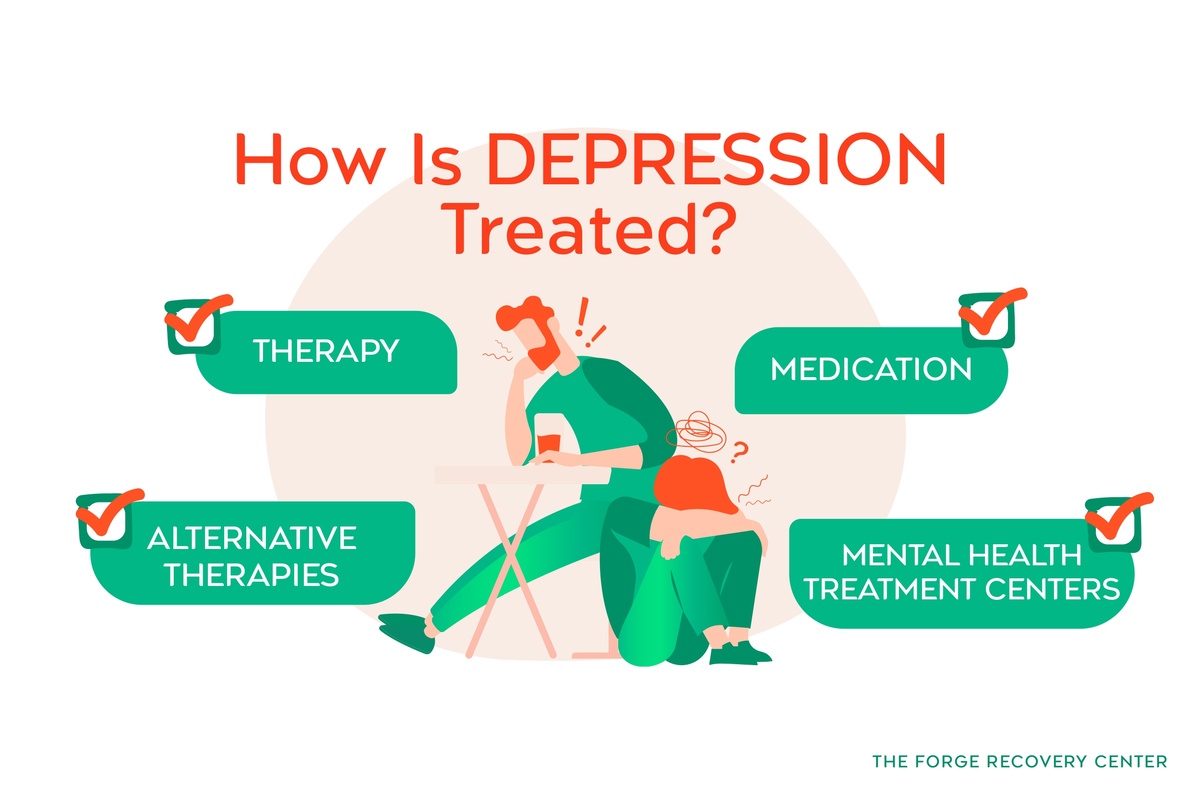Depression: Symptoms, Causes, & Treatment Avenues


Depression can cast a heavy cloud over your daily life, manifesting in persistent feelings of sadness, loss of interest, and difficulty in performing everyday tasks. We understand the struggles it brings but remember, you’re not alone — and treatment is available. Learn more about the symptoms and treatment options for this mood disorder, and call The Forge Recovery Center today if you or a loved one are ready to work toward mental clarity, stability, and well-being.
What Is Depression?
Depression is a mental health disorder characterized by persistent feelings of sadness, hopelessness, and a loss of interest in activities that were once enjoyable. It can affect how a person thinks, feels, and behaves, leading to difficulties in daily functioning. Symptoms of depression can vary from person to person but may include fatigue, changes in appetite, difficulty concentrating, and thoughts of self-harm or suicide. It’s a serious condition that requires treatment, such as therapy, medication, or a combination of both to help manage symptoms and improve overall well-being.
Symptoms of Depression
Common symptoms of depression include persistent feelings of sadness that spread into every aspect of life, along with physical signs such as appetite fluctuations and sleeping difficulties. Here’s a more detailed overview of the symptoms associated with depression:
Emotional Signs
When experiencing depression symptoms, you may notice emotional signs like feelings of sadness, guilt, and hopelessness. These emotions can weigh heavily on you, affecting your daily life. A depressed mood is a common emotional symptom, making it challenging to find joy in activities you once enjoyed. The loss of interest in hobbies or social interactions is also prevalent during depressive episodes.
The intensity of these emotional signs can vary depending on the severity of the bipolar disorder experience or depressive episodes. It's crucial to recognize these signs early for proper intervention.
Physical Symptoms
Physical symptoms of depression include changes in appetite, such as overeating or loss of appetite. Disrupted sleep patterns, either sleeping too much or experiencing insomnia, are also common. Fatigue is a prevalent physical symptom that can significantly impact your daily functioning. You might feel constantly tired and lacking energy even after a full night's rest.
The connection between physical symptoms and overall well-being is profound. Addressing both the emotional and physical aspects of depression is essential for holistic recovery.

Are You Struggling with Mental Health or Addiction?
We Can Help. Call Us Now!
CALL: 877-839-1772
How Is Depression Treated?

Depression is primarily treated with therapy, or a combination of therapy and medication, which can be administered by a mental health professional or mental health treatment center. Medications commonly used to treat depression include antidepressants such as SSRIs. Alternative therapies may also help, such as mindfulness training, meditation, and yoga. Here’s a more in-depth summary of the treatment options available for depression:
Therapy
When addressing depression, therapy plays a crucial role in helping you manage your symptoms effectively. Cognitive behavioral therapy (CBT) is a proven method that focuses on changing negative thought patterns and behaviors. This therapy helps you develop coping strategies to deal with depressive symptoms.
Seeking problem-solving therapy can also be beneficial for individuals struggling with depression. This approach assists you in identifying practical solutions to everyday challenges that may contribute to your feelings of sadness or hopelessness. By learning problem-solving skills, you can regain a sense of control over your life.
It's essential to consider therapy as an integral part of your treatment plan for depression. Engaging in regular sessions with a qualified therapist provides you with a safe space to explore your emotions, gain insights into your condition, and acquire valuable tools for managing depressive episodes.
Medication
When it comes to treating moderate to severe depression, antidepressant medications, such as Selective Serotonin Reuptake Inhibitors (SSRIs), are commonly prescribed. These medications work by balancing neurotransmitters in the brain, which can help alleviate symptoms of depression over time.
Health-care providers carefully evaluate various factors before recommending medication for depression. They consider your medical history, current symptoms, potential side effects, and overall health status to determine the most suitable treatment option for you.
Adhering to your prescribed medication regimen is crucial for effectively managing depressive symptoms. Consistent medication adherence ensures that you receive the full benefits of the treatment and minimizes the risk of relapse or worsening of your condition.
Alternative Therapies
In addition to traditional treatments, incorporating alternative therapies like mindfulness and meditation can offer additional support in managing depression. These practices promote relaxation, reduce stress levels, and enhance emotional well-being.
Engaging in exercise programs has been shown to have positive effects on mood and overall mental health. Physical activity releases endorphins, which are natural mood lifters, and can significantly improve symptoms of depression when included as part of your treatment plan.
Alternative therapies can complement conventional treatments by providing holistic care that addresses not only the symptoms but also the underlying causes of depression. By exploring different approaches, you can tailor your treatment plan to suit your individual needs.
Mental Health Treatment Centers
Mental health and drug rehab treatment centers offer a range of services tailored specifically for individuals dealing with depression. These centers provide comprehensive care that may include therapy sessions, medication management, group support programs, and specialized interventions.
Seeking specialized care at mental health and drug rehab treatment centers ensures that you receive personalized attention from experienced professionals who understand the complexities of treating depression, as well as cases of dual diagnosis involving both mental health and substance use disorders. Their expertise allows them to create customized treatment plans based on your unique needs and circumstances.
Mental health professionals at these centers play a pivotal role in providing holistic care by addressing both the physical and emotional aspects of depression. By collaborating with a multidisciplinary team, you can access integrated treatment approaches that promote long-term recovery and well-being.
Types of Depression
Major Depressive Disorder
Formerly called clinical depression, major depressive disorder is a severe form of depression that necessitates professional intervention. It is diagnosed based on specific criteria, including persistent feelings of sadness and loss of interest in activities. Symptoms of clinical depression may include changes in appetite, sleep disturbances, and feelings of worthlessness. Early detection and treatment are crucial in managing clinical depression effectively.
Persistent Depressive Disorder (PDD)
Persistent Depressive Disorder (PDD) is a long-lasting form of depression characterized by persistent symptoms that can last for years. Individuals with PDD may face challenges in managing their symptoms on a daily basis, impacting their quality of life. Treatment options for PDD typically involve a combination of therapy and medication to alleviate symptoms and improve overall well-being.
Disruptive Mood Dysregulation Disorder (DMDD)
Disruptive Mood Dysregulation Disorder (DMDD) is a condition characterized by severe and recurrent temper outbursts that are disproportionate to the situation. It significantly impacts children and adolescents' emotional well-being, leading to difficulties in social interactions and academic performance. Early intervention and treatment strategies such as therapy and behavioral interventions are essential for individuals with DMDD.
Premenstrual Dysphoric Disorder (PMDD)
Premenstrual Dysphoric Disorder (PMDD) is a severe form of premenstrual syndrome that affects mood and behavior, typically occurring during the luteal phase of the menstrual cycle. Symptoms of PMDD include mood swings, irritability, and physical discomfort. Treatment options for PMDD may include lifestyle changes, medication, and therapy to manage symptoms effectively.
Seasonal Affective Disorder (SAD)
Seasonal Affective Disorder (SAD) is a type of depression that occurs seasonally, often during the winter months when there is less natural sunlight. Light therapy and lifestyle modifications such as regular exercise and maintaining a healthy diet can help alleviate SAD symptoms. Early recognition and treatment play a vital role in minimizing the impact of SAD on your mental health.
Postpartum Depression
Postpartum depression is a mood disorder that affects women after childbirth due to hormonal changes, sleep deprivation, or stressors related to motherhood. Risk factors for postpartum depression include a history of mental health issues or lack of social support. Support from loved ones, therapy, medication, or support groups can aid in managing postpartum depression effectively.
Atypical Depression
Atypical depression is a subtype characterized by unique symptoms like increased appetite, oversleeping, sensitivity to rejection, or heavy feeling in arms or legs. Diagnosis involves evaluating specific criteria such as mood reactivity or interpersonal rejection sensitivity. Tailored treatment plans incorporating therapy or medication can help individuals with atypical depression manage their symptoms effectively.

Are You Struggling with Mental Health or Addiction?
We Can Help. Call Us Now!
CALL: 877-839-1772
What Causes Depression?
Depression doesn’t typically arise due to a single cause. Rather, it can stem from multiple causes ranging from your family history of depression to how you respond to stressful life events. Let’s explore the full spectrum of causes and the parts they play:
Genetic Predisposition
Genetics can play a significant role in predisposing individuals to depression. Family history is crucial in assessing your risk of developing depression. Understanding this predisposition can help tailor more effective treatment plans for you.
When it comes to genetic predisposition, knowing if depression runs in your family can provide valuable insights into your own mental health. This awareness allows healthcare professionals to personalize your treatment based on the genetic factors influencing your condition. By recognizing these genetic links, you and your healthcare provider can better navigate the complexities of managing depression effectively.
Life Events
Adverse life events such as bereavement can trigger or exacerbate depression. Traumatic experiences have a profound impact on your mental well-being, potentially leading to depressive symptoms. Developing healthy coping mechanisms is essential in mitigating the effects of life events on your mental health.
In times of hardship, having a support system that understands and assists you through challenging situations can significantly alleviate the burden of dealing with depression alone. Coping strategies like seeking therapy or engaging in activities that bring you joy are vital tools in managing the emotional toll of adverse life events on your mental health.
Environmental Influences
Environmental factors like social support can either protect against or contribute to the onset and progression of depression. The presence or absence of supportive relationships can greatly influence how you navigate through depressive episodes. Environmental stressors, such as financial difficulties or work-related pressures, can intensify depressive symptoms.
Creating a nurturing environment filled with positive influences and supportive relationships is key in fostering emotional well-being and resilience against the negative impacts of environmental stressors. Surrounding yourself with understanding and compassionate individuals can provide comfort and strength during challenging times, aiding in your journey towards managing depression effectively.
Substance Use & Addiction
There is a strong link between substance use, addiction, and depression. Engaging in substance abuse can exacerbate existing depressive symptoms and complicate recovery efforts. Treatment approaches for individuals facing both depression and substance use disorders often involve integrated care that addresses both conditions simultaneously.
If you find yourself struggling with both depression and substance abuse, seeking professional help is crucial for addressing these intertwined issues effectively. Integrated treatment plans that target both conditions concurrently offer a comprehensive approach to recovery, focusing on improving overall mental health and well-being.
How Is Depression Diagnosed?
Diagnosing depression starts with a professional evaluation, which compares symptoms of individuals with diagnostic criteria found in the DSM-5:
Professional Evaluation
When seeking help for depression, it is crucial to undergo a professional evaluation. This evaluation involves healthcare providers assessing your symptoms to provide an accurate diagnosis. Mental health professionals play a key role in this process by conducting in-depth assessments to understand the severity and nature of your depressive symptoms. Based on these evaluations, personalized treatment plans are developed to address your specific needs.
Healthcare providers use various tools and methods during the assessment process. These may include interviews, questionnaires, and observation of behaviors. By gathering information about your symptoms, medical history, and daily functioning, they can better evaluate the presence of depression. This thorough evaluation helps in determining the most suitable treatment approach for you.
Diagnostic Criteria
To diagnose depression accurately, healthcare providers refer to specific diagnostic criteria outlined in the DSM-5 (Diagnostic and Statistical Manual of Mental Disorders). Meeting these criteria is essential for identifying different types of depressive disorders such as major depressive disorder or persistent depressive disorder. By adhering to these criteria, healthcare providers can ensure a precise diagnosis that aligns with established guidelines.
The diagnostic criteria not only aid in identifying depression but also guide treatment decisions. They help determine the most effective interventions based on the type and severity of your symptoms. By following standardized criteria, healthcare providers can tailor treatment plans that address your unique needs and promote recovery. Understanding these diagnostic guidelines is crucial for receiving appropriate care for depression.
Are You Struggling with Mental Health or Addiction?
We Can Help. Call Us Now!
CALL: 877-839-1772
Self-Care Techniques
Taking proper care of yourself alongside professional treatment is key. Keeping a daily routine, for example, can largely contribute to a stable mood while self-care practices help you maintain healthy habits. Other examples include mindfulness practice, exercise, and working on maintaining healthy relationships. Here’s a breakdown of self-care techniques to consider as you carry through therapy and treatment for depression:
Daily Routines
When managing depression, establishing structured daily routines is crucial. By following a consistent schedule, you can improve your mood and overall well-being. Incorporating self-care practices into your daily routine helps maintain healthy habits.
A structured routine provides a sense of stability and predictability, which can be comforting for individuals struggling with depression. It helps reduce feelings of uncertainty and promotes a sense of control over your day. Engaging in activities like waking up and going to bed at the same time each day can positively impact your mental health.
Mindfulness & Exercise
Practicing mindfulness techniques such as meditation and deep breathing exercises can reduce stress, anxiety, and depressive symptoms. Mindfulness encourages you to focus on the present moment, promoting relaxation and emotional well-being. Regular exercise is also essential for managing depression as it releases endorphins that boost mood and energy levels.
Incorporating mindfulness practices and exercise into your daily routine can significantly enhance the effectiveness of treatment for depression. These activities not only improve physical health but also contribute to better mental health outcomes. Engaging in mindfulness exercises like yoga or going for a walk can help you stay grounded and focused.
Healthy Relationships
Maintaining healthy relationships is vital for your mental health and well-being when dealing with depression. Supportive relationships provide emotional stability, comfort, and reassurance during challenging times. Communicating openly with loved ones about your feelings and needs fosters understanding and strengthens bonds.
Healthy relationships offer a sense of belonging, acceptance, and connection, which are essential for combating feelings of loneliness or isolation often associated with depression. Setting boundaries within relationships ensures that your emotional well-being is protected while receiving the support you need from those around you.

Depression Prevalence Rates
Depression is a widespread mental health condition impacting hundreds of millions of people worldwide, and an alarming percentage of Americans. To give you an idea of its prevalence, we’ve gathered some of the most recent data points related to depression:
Global Impact
Globally, depression is a significant public health concern, affecting more than 264 million people of all ages according to the World Health Organization (WHO). It is a leading cause of disability worldwide.
Depression does not discriminate based on age, gender, or socio-economic status. Young adults, especially young women, are particularly vulnerable to developing depression.
U.S. Impact
In the United States, depression is a prevalent mental health issue. According to recent statistics, approximately 21 million adults in the U.S. have experienced at least one major depressive episode in their lifetime, representing over 8% of all American adults.
These numbers highlight the significant impact that depression has on individuals across the country and emphasize the importance of seeking treatment and support for those struggling with this condition.
Are You Struggling with Mental Health or Addiction?
We Can Help. Call Us Now!
CALL: 877-839-1772
Closing Thoughts
Now that you understand depression better, recognizing its symptoms, treatment options, types, causes, and diagnosis methods, it's crucial to prioritize self-care techniques, acknowledge prevalence rates, and consider seeking professional help if needed. Taking care of your mental health is essential for your overall well-being. Remember that you are not alone in this journey; support is available.
If you or someone you know is struggling with depression, don't hesitate to reach out for help. Your mental health matters, and seeking treatment can make a significant difference in your life. Stay informed, practice self-care, and remember that there is always hope and support available to you.
Orange County Depression Treatment
Depression adds a whole new layer of difficulty to life. The nonstop feelings of sadness and emptiness can keep you in bed for weeks on end, drain the joy from activities that you once loved, and fracture your most treasured relationships. At The Forge Recovery Center, we fully understand the weight of these struggles and are here to remind you that support is available.
With our team of mental health experts and a set of evidence-based therapies to guide you, you’ll have everything you need to manage depressive symptoms and move forward with confidence. Call The Forge Recovery Center today if you or a loved one require professional support on your path to healing.
Treatment Modalities We Offer
At The Forge Recovery Center, we use evidence-proven treatment modalities to address depression and related disorders, including:
Case Management
Our specialists guide clients towards recovery-supportive resources, assessing personal risks to develop a comprehensive treatment strategy.
CBT
CBT assists clients in transforming negative thought patterns and behaviors linked to drug addiction, aiming to avert relapse and encourage a drug-free existence.
DBT
DBT supports those struggling with emotional turmoil from substance misuse, fostering emotional regulation and positive life changes.
EMDR
EMDR helps clients process trauma that may affect their addiction, using eye movement techniques to alleviate psychological stress.
Experiential
With experiential therapy, patients can rediscover life’s joys and address the underlying trauma of addictive habits through immersive therapeutic activities.
Family Counseling
Family therapy fortifies familial ties and cultivates a supportive network essential for enduring recovery and abstinence.
Group Therapy
Group therapy provides a collective space for encouragement, enhancing recovery through shared stories and mutual strength.
Individual Therapy
Tailored sessions concentrate on the unique challenges faced by each client, aiding their progress towards a substance-free life.
MAT
MAT combines certified medications with counseling to combat addiction effectively, easing withdrawal symptoms and reducing the chance of relapse.
TMS
TMS, a non-invasive method, uses magnetic fields to activate the brain, helping to lower intense drug cravings.
Motivational Interviewing
This approach inspires clients to pursue healthier choices, such as overcoming cocaine addiction, by fostering a sense of self-efficacy.
Trauma-Informed Care
Recognizing trauma’s role in addiction, this method is proven effective in guiding clients through treatment and understanding its impact on their mental and emotional health.



